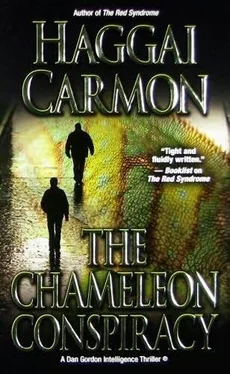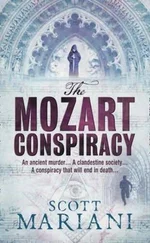Haggai Harmon - The Chameleon Conspiracy
Здесь есть возможность читать онлайн «Haggai Harmon - The Chameleon Conspiracy» весь текст электронной книги совершенно бесплатно (целиком полную версию без сокращений). В некоторых случаях можно слушать аудио, скачать через торрент в формате fb2 и присутствует краткое содержание. Жанр: Триллер, на английском языке. Описание произведения, (предисловие) а так же отзывы посетителей доступны на портале библиотеки ЛибКат.
- Название:The Chameleon Conspiracy
- Автор:
- Жанр:
- Год:неизвестен
- ISBN:нет данных
- Рейтинг книги:5 / 5. Голосов: 1
-
Избранное:Добавить в избранное
- Отзывы:
-
Ваша оценка:
- 100
- 1
- 2
- 3
- 4
- 5
The Chameleon Conspiracy: краткое содержание, описание и аннотация
Предлагаем к чтению аннотацию, описание, краткое содержание или предисловие (зависит от того, что написал сам автор книги «The Chameleon Conspiracy»). Если вы не нашли необходимую информацию о книге — напишите в комментариях, мы постараемся отыскать её.
The Chameleon Conspiracy — читать онлайн бесплатно полную книгу (весь текст) целиком
Ниже представлен текст книги, разбитый по страницам. Система сохранения места последней прочитанной страницы, позволяет с удобством читать онлайн бесплатно книгу «The Chameleon Conspiracy», без необходимости каждый раз заново искать на чём Вы остановились. Поставьте закладку, и сможете в любой момент перейти на страницу, на которой закончили чтение.
Интервал:
Закладка:
“Did he discuss Lennox’s accent with you, or just mention it?”
“Well, he said Lennox definitely didn’t grow up in Wisconsin, which is what he told us.”
“What made him say that?”
“Louis used to go every summer to Wisconsin to teach drama to local kids in a summer camp. He could do that accent really well. So, one day he mentioned to Lennox that he’d been teaching in Oconomowoc, in the lake country. Lennox tried to change the subject, and he mispronounced Oconomowoc. Then Louis made a joke about people from Wisconsin saying ‘cripes’ a lot, but Lennox didn’t seem to get it either. Louis thought it was really weird. But I told him, ‘What do we know? Maybe Lennox left Wisconsin when he was young. Anyway,’ I said, ‘why should we care? He pays rent on time and doesn’t damage our property.’ ”
It wasn’t much, but was at least something. “Did your husband continue to be suspicious of Lennox?”
She thought for a moment. “I don’t know if I’d call it suspicious. He was just a little uneasy about him. He thought maybe Lennox had made it all up-had this crazy idea that maybe he was on the run from the police. Anyway, I don’t know if it’s important, but Louis said something once about how Lennox stretched his a ’s and h ’s.”
“What, like a Southern drawl?”
“No, not like any American accent he knew. He’d taught speech for years, so Louis really knew his accents. Once he said he was sure that Lennox wasn’t even American. But you know, that was before nine eleven. What did we know?” That was an attention-grabbing remark. I picked up on that.
“Why do you mention nine eleven?”
“Well, you know…” She sounded reluctant to pursue the point. “He had sort of dark skin. Not like he was black or Latino. Just a little darker than your typical Wisconsin dairy farmer, I guess, who’s as white as his cows’ milk.”
I thanked her and hung up. I hadn’t considered that direction. The yearbook’s black-and-white photo wasn’t high quality enough to set Ward-or Lennox?-apart from the other awkward teenagers on the page. I flipped through the file quickly. The FBI field office in Milwaukee reported on state records that showed that a Marshall Stuart Lennox was born in Meriter Hospital, Madison, Wisconsin, on June 11, 1960. His parents were Arthur James Lennox and Gretchen Melanie Lennox, nee Schilling. Lennox attended local public schools and dropped out during the eleventh grade. He was issued a U.S. passport on May 1, 1980, and left the U.S. on a student charter flight to Athens, Greece. Both his parents died in a car accident two years later. Lennox had no siblings or any other known family members. A more recent report indicated that the neighborhood he grew up in had changed- people had moved out and small businesses and garages had moved in. From those who’d stayed behind, very few people who were interviewed remembered the family.
The first two aliases I’d randomly checked, Lennox and McClure, had some things in common: they both belonged to young men who grew up in the Midwest, had no known living relatives, and both had left the country in 1980.
I flipped through the pages of the FBI report and its attachments, pulling out the file on the first-reported savings-bank-fraud case in South Dakota. There, the con man had presented himself as Harrington T. Whitney-Davis. The FBI report went over the history of Harrington T. Whitney-Davis: born in Fargo, North Dakota, on April 6, 1959. Like a junkie looking for a fix, I quickly ran my eyes over the interesting, though now less relevant, stuff. All I wanted to know at that moment was whether Harrington T. Whitney-Davis had gotten a passport and left the country.
He hadn’t, or at least the FBI report said nothing about it. My hopes deflated. The strange thing was, the name Harrington T. Whitney-Davis stopped appearing on mailing lists, credit reports, and IRS records in 1981. I opened the next file folder.
The con man in this one had appeared in a small town in Nebraska as Harold S. McClure. The FBI report gave his date of birth as March 1, 1958. I wasn’t interested in the rest of the bio. Not just yet. Right now, all I needed to know was if he had disappeared from the U.S. like the others. It took just one glance to find out. Yes, Harold S. McClure had applied for a passport in July, 1980, and left shortly thereafter for Canada through a land-border crossing. Soon, his name stopped appearing in public records, until it resurfaced years later in the U.S. for a few months.
One thing was clear: we had ourselves a modus operandi. It was all too much to be a coincidence. Operating now with a solid lead, I decided to check the other eight names in the FBI file later. I had a direction. Three, maybe more, young American men in their early twenties left the United States in 1980, showing signs of life just long enough to carry out highly lucrative scams. Did Ward have anything to do with their disappearances? Did he know that they were absent from the U.S.? And if so, how? And then there was one more intriguing question. Without physical evidence, how did the FBI tie the eleven scams to Ward, despite the eleven different aliases? I couldn’t answer the first two questions, but I could take a stab at the third by asking the FBI itself.
I called FBI Special Agent Kevin Lee, the last agent named in the topmost file. After the unavoidable cordialities, I asked him how they had connected Ward to all eleven scams.
“Well, our guys down at Quantico are pretty good at this type of analysis,” he told me. “The physical descriptions of all the defendants made by all victims generally matched Ward’s. We’ve a similar MO, and based upon that and other evidence we concluded that all the cases were perpetrated by one person.”
“Other evidence? What evidence? I thought I had it all in the file.”
“Let me look,” he said. “This case is old.”
You’re damn right about that, I thought.
An hour later he called. “OK, we also discovered that each perpetrator used the same Delaware incorporation-service company to incorporate all the companies used in the scams.”
“Did you interview the principals of the service company?”
“No. The company went out of business, and the directors disappeared without leaving a trace.”
“Any additional evidence?” Based on what he’d told me, the FBI’s backing seemed thin. “You know, as in, did you ever have the witnesses take a look at Ward’s high school photo in a spread? Ask them to pick out the guy they gave their money to?” I tried not to sound like I was criticizing their work.
He sounded vaguely annoyed. “Well, I’ll have to look up the file again. It was a long time ago. Anyway, all eleven aliases were of white males born between 1959 and 1962 in the Midwest.”
“Did anyone check any passport applications of these people?”
“No. The State Department gets rid of routine passport applications after one year.”
“So there’s nothing on file?”
“The State Department may have something more. Why don’t you ask them?” he said, having lost interest. I hung up, shaking my head at the apparent incompetence. It would be my job to pick up the slack.
I called the principal of the Milwaukee Trade and Technical High School’s Evening School, from which Ward had graduated, identifying myself and my business. The secretary told me politely that the principal in the seventies and eighties, Donald Peterson, had retired to Arizona, but offered to give him my number. Within five minutes, my phone rang.
“Yes, I remember Ward well,” said Peterson. “I hope he hasn’t done anything foolish. Has he?”
“I don’t think so,” I said. “Please tell me about him.”
“He was a decent young man. Very curious, loved geography and photography, and he said he wanted to be a photographer for National Geographic Magazine someday. I always wondered if he fulfilled that dream. He did manage to graduate in spite of his handicap.”
Читать дальшеИнтервал:
Закладка:
Похожие книги на «The Chameleon Conspiracy»
Представляем Вашему вниманию похожие книги на «The Chameleon Conspiracy» списком для выбора. Мы отобрали схожую по названию и смыслу литературу в надежде предоставить читателям больше вариантов отыскать новые, интересные, ещё непрочитанные произведения.
Обсуждение, отзывы о книге «The Chameleon Conspiracy» и просто собственные мнения читателей. Оставьте ваши комментарии, напишите, что Вы думаете о произведении, его смысле или главных героях. Укажите что конкретно понравилось, а что нет, и почему Вы так считаете.












